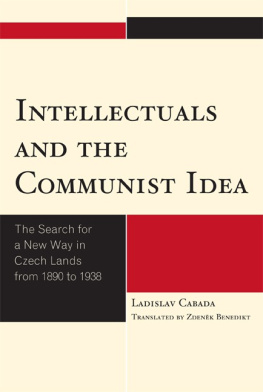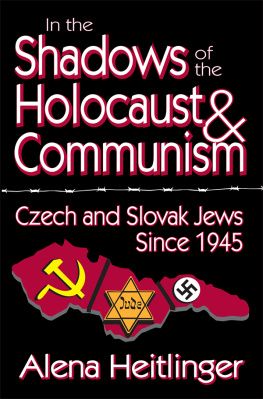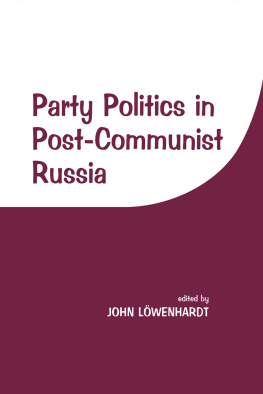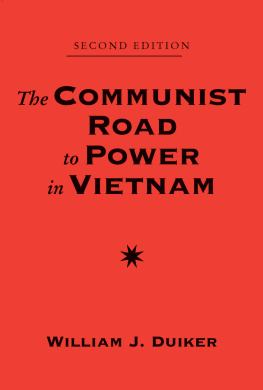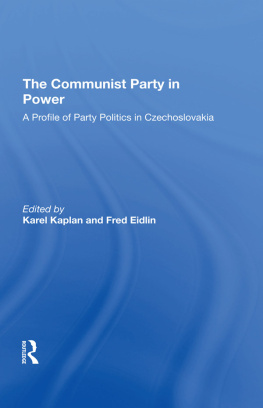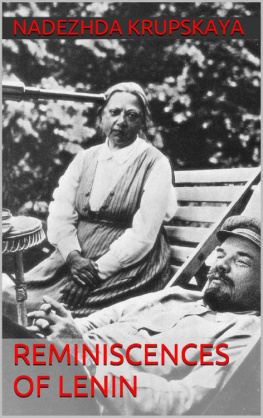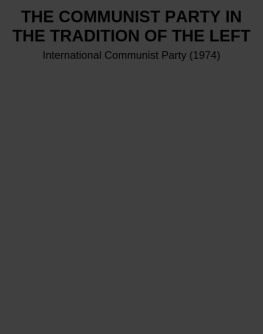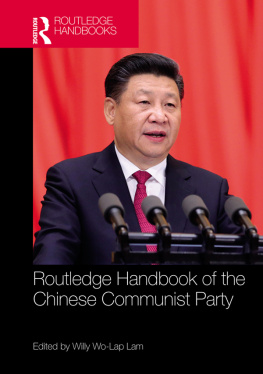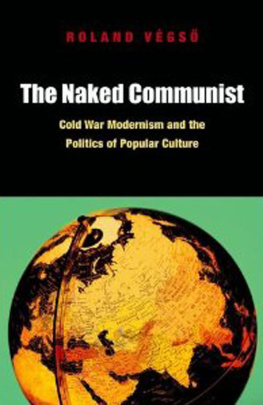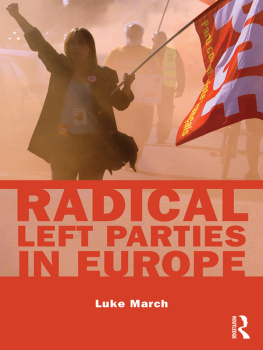Intellectuals and the Communist Idea
Intellectuals and the Communist Idea
The Search for a New Way in Czech Lands from 1890 to 1938
Ladislav Cabada
Lexington Books
A division of
ROWMAN & LITTLEFIELD PUBLISHERS, INC.
Lanham Boulder New York Toronto Plymouth, UK
2010
Published by Lexington Books
A division of Rowman & Littlefield Publishers, Inc.
A wholly owned subsidiary of The Rowman & Littlefield Publishing Group, Inc.
4501 Forbes Boulevard, Suite 200, Lanham, Maryland 20706
www.lexingtonbooks.com
Estover Road, Plymouth PL6 7PY, United Kingdom
Copyright 2010 by Lexington Books
All rights reserved . No part of this book may be reproduced in any form or by any electronic or mechanical means, including information storage and retrieval systems, without written permission from the publisher, except by a reviewer who may quote passages in a review.
British Library Cataloguing in Publication Information Available
Library of Congress Cataloging-in-Publication Data
Cabada, Ladislav.
Intellectuals and the Communist idea : the search for a new way in Czech lands from 1890 to 1938 / Ladislav Cabada.
p. cm.
Includes bibliographical references and index.
ISBN 978-0-7391-4376-6 (cloth : alk. paper)
ISBN 978-0-7391-4378-0 (electronic)
1. CommunismCzechoslovakiaHistory20th century. 2. Communism and intellectualsCzechoslovakiaHistory20th century. 3. Socialist partiesCzechoslovakiaHistory. 4. Komunistick strana CeskoslovenskaHistory20th century. 5. CzechoslovakiaPolitics and government19181938. I. Title.
HX260.3.A6C33 2010
320.5320943709041dc22 2010022252
` The paper used in this publication meets the minimum requirements of American National Standard for Information SciencesPermanence of Paper for Printed Library Materials, ANSI/NISO Z39.48-1992.
Printed in the United States of America
For rka and Hanna
Acknowledgments
When in 1995 I was facing the decision of what topic to focus on in my masters thesis in political science, I took advantage of the fact that this field of science was only in its early developmental stage in the Czech environment. As political science was able to be established in the Czech Republic only after 1989, in the mid-1990s this field of study was far from anchored in institutional, personal, or content terms. Therefore, I had the chance to write about the political consequences of the works of the Czech poet Vt e zslav Nezval, whose works I found charming, and whom I also remembered as one of the prominent Czech writers who most loyally took part in building the totalitarian regime in Czechoslovakia after 1945. The thesis was supervised by Blanka R chov, currently head of the Department of Political Science at the Faculty of Social Sciences, Charles University.
However, the study of Nezvals personal path and its intersection with Czechoslovak politics of the first half of the twentieth century rather than clear answers brought me in the years 1995 and 1996 a number of additional questions, this time about entire artistic movements and generations. That is why I decided to significantly expand my research territory and concentrate on the question of the mutual influence between the Czech politics of the left and the cultural and intellectual sphere. In terms of time, my research was limited on the one hand by the 1890s, when following the partial application of general suffrage in the Czech lands the first modern political parties and other political figures were established, and on the other hand by the year 1938, when after the Munich Dictate the Masaryk-era democratic First Czechoslovak Republic ceased to exist. I decided to concentrate on the intellectual and ideological grassroots of the interwar communist artistic vanguard, as it grew from communist, utopian-socialist, and Marxist and Leninist positions. Apart from this theme I also focused on the development of the coexistence of these groups with the Communist Party of Czechoslovakia between the two world wars.
The above-mentioned theme was extensively covered by Czech historiography and literary science after 1948; however, I was of the opinion that their research naturally bore an ideological mark, was exposed to (self-)censorship and also failed to utilize certain sources. Therefore, I decided to review so far unused resources (particularly communist intellectuals own literary works), but I also turned to until then largely ignored sourcesinterwar leftist press, which was not institutionally connected to the Communist Party, as well as some newly available archives. I spent almost two years in the archives, mainly in the National Library in Prague. I would like to express my appreciation to the librarians in the magazine section of the library for their support, and also to Martina Beneovsk, librarian of the Ministry of Foreign Affairs, whose assistance and contacts helped me reach a number of significant sources. I was able to discuss a number of questions with my friendsstudents of mass communication, political science, and Czech studiesparticularly Lubo Brabec, Radek Dyntar, Martin Ehl, Michal Lamprecht, and Eva and Radim Prochzka.
All the collected information was sorted mainly with the help of the consultant of my dissertation, Vladimr Novotn, who now works at the Department of Czech Studies at the School of Education, University of West Bohemia in Pilsen. The final form of the dissertation was significantly influenced by Ivan Bernik, a sociologist and my mentor during my studies at the Faculty of Social Sciences at the University of Ljubljana/Slovenia, where I spent one year of my doctoral study. Ivan Bernik offered me the theoretical and methodological framework for organizing my research findingsmainly in the form of the theory and sociology of cultureand at the same time tactfully and uncompromisingly saw to it that I finished the dissertation. For this, as well as other things, he has my appreciation.
I successfully defended my dissertation in 1999 and subsequently had it published in Czech. It was first published in 2000 by the Institute for Central-European Culture and Politics (ISE)my thanks mainly to the director of the publishing house, Rudolf Ku c eraand it was published for the second time in 2005 by the publishing company of Ale C en e k. I am very happy that I can offer my revised edition of this text to a larger number of readers. For this I would like to thank mainly Michael Sisskin from Lexington Books and also the Department of Politics and International Relations at the Faculty of Philosophy and Arts, University of West Bohemia in Pilsen, where I have been teaching for more than ten years and which provided the necessary financial support to publish the English version of the book. Special thanks to Zuzana Kr c lov and Alera Frankov for their help throughout the process of publication.
And last but not least, I would like to thank my family, my wife, rka Waisov, and my daughter, Hanna, for their continued support and understanding. I dedicate this book to them.

